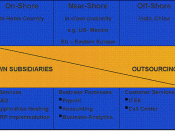Internal/External Sourcing � PAGE \* MERGEFORMAT �1�
�
Internal/External Sourcing
Outsourcing has become the commonplace trend over the past decade as organizations are developing their long term strategies to evaluate options to reduce operational and overhead costs. According to a 2005 Gardner study shows "80% of companies that outsource their customer supported tasks are failing to meet their intended cost savings objectives" (Pfeifer, 2006). Outsourcing with a sole focus on the cost of goods has been a short sighted approach as there are many under budgeted, unseen costs associated with customer dissatisfaction and loss of product quality. The success of outsourcing strategies have revealed four value added areas that can contribute to a company's Competitive Advantage, Employees, Suppliers, and Customers.
Last year the United States companies spent about $29 billion on outsourcing activity or products (Thomas, 2009). Without a doubt, outsourcing is a major part of the business strategy that drives organizations to success.
If at its simplest version of buying raw materials from a large supplier to its most complex variation of off-shoring services, outsourcing is present in all business strategies.
However, outsourcing strategies are not always successful; therefore it is crucial to understand the factors that influence a company's outsourcing strategy. The basis of outsourcing is the same one as the trade theory in which two or more parties benefit from the exchange of goods or services. Outsourcing and trade are beneficial for many reasons including cost savings and increase in wealth, but the main reason companies incorporate outsourcing into their business strategy can be explained in terms of comparative advantage.
A business can be divided into three types of functions as core functions, tactical non-core functions and strategic non-core functions (Tompkins, 2007). Core functions are those that dictate the comparative advantage of the company; they are...


